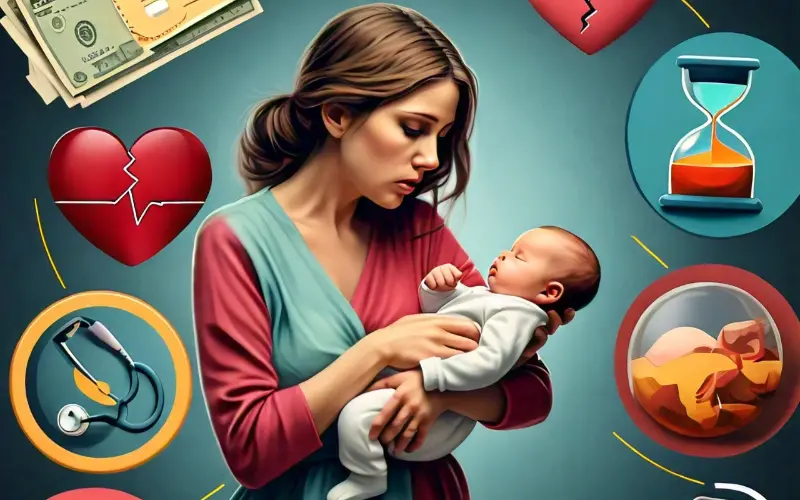Postpartum depression is a genuine and complicated mental health issue that mainly affects new mothers. Medical studies show that this type of depression actually comes into existence during the first weeks after the delivery or childbirth. Postpartum depression is really a concerning issue because it is not resolved in a normal way like the typical baby blues. Baby blues is basically a feeling of sadness that most women experience after delivery. So it becomes very important to understand postpartum depression symptoms, its treatments and support networks, because it can be very challenging for new mothers and also for their child and families. This complete comprehensive article is all about.
What is Postpartum Depression?
There are different types of depression where postpartum depression is basically a clinical type of depression. This depression may occur after delivery. It is a dangerous disease which demands careful monitoring and treatment. The exact cause of postpartum depression is not known but most researchers actually agree that there are certain factors that combine together to create this type of serious depressive disorder. The changes in hormones and mental adjustments to become parents and tiredness are all contributing factors towards PPD.

Symptoms of Postpartum Depression
It is very important to identify symptoms of postpartum depression because it is a first step towards better treatment. Here we are going to talk about some of the common symptoms that an affected person can experience. Let’s have a look.
Constant Sadness or Hopelessness
The common symptom in case of postpartum depression is feeling of sadness or hopelessness in a consistent way. An affected woman feels sadness or loneliness throughout the day.
Severe Changes in Mood
Most of the women experience mood swings after giving birth to a child which are sometimes very difficult to handle.
Excessive Crying
After delivery it is also observed that a woman starts crying excessively without even any particular reasons.
Difficulty Bonding with the Baby
It is also possible that some of the women after delivery feel difficulty bonding with their baby.
Withdrawal from Family and Friends
Sometimes women isolate themselves from social activities and withdraw from their friends and family.

Loss of Appetite or Overeating
After giving birth to a child the eating pattern also changes in most of the women. There is a possibility of losing their appetite or they start eating excessively as compared to before. In this way the chances of weight loss and weight gain increases.
Sleeping Too Much
Some women experience difficulties in proper sleeping while some start sleeping excessively after delivery. Too much sleeping is called insomnia in medical terms.
Extreme Tiredness
In most of the cases it is observed that women feel extreme tiredness and fatigue even after complete rest.
Feelings of Useless or Regret
The feelings of guilt or meaninglessness are also one of the common symptoms of postpartum depression.

Anxiety and Panic Attacks
Another important symptom here in case of postpartum depression is the feeling of serious anxiety or panic episodes.
Thoughts about Harming Oneself or the Baby
This is a very serious symptom that some of the women develop unwanted ideas like killing oneself or the baby.
It is really important to note that these are the possible symptoms of postpartum depression. If these symptoms continue for more than two weeks then the situation is really concerning. That means you must consult your professional healthcare provider in an urgent way.
Risk Factors for Postpartum Depression
There are some factors that can also increase the risk of postpartum depression. Let’s find out.

History of Depression
Those women who have a history of depression or some other psychological issues are at a higher level of risk to develop postpartum depression.
Lack of Support
It is really important to provide full support to new parents in their challenging time. Those women who don’t get reasonable support from their friends and family after giving birth to a child, the chances of postpartum depression increases.
Stressful Life Experiences
Sometimes unpleasant experiences in life especially during or after pregnancy can lead to postpartum depression.
Complications in Pregnancy or Childbirth
The chances of postpartum depression increases to a greater extent in those women who experience complications during their pregnancy or delivery.
Changes in Hormones
In most of the cases hormones start declining rapidly after delivery. When this happens, the changes in mood are understandable.
Breastfeeding Difficulties
Some mothers feel difficulty during breastfeeding. In this way frustration can create that can automatically lead to postpartum depression.
Lack of Sleep
It is obvious that after giving birth to a child the sleeping quality of most mothers reduces to a great extent. This is also one of the important risk factors towards postpartum depression.
Effective Treatment of Postpartum Depression
When we call effective treatment then it means trying to reduce symptoms of any disease to a greater extent. Same is the case here for postpartum depression. There are different ways and means for effective treatment in this case. Some of the important treatment options are as follows.

Therapy
Cognitive Behavioral Therapy
Cognitive behavioral therapy commonly known as CBT is that type of therapy that helps to identify and change dangerous thinking habits.
Impersonal Therapy
Impersonal therapy is really very helpful in order to improve the abilities of communication and relationships.
Support Groups
At the time of the challenging atmosphere, new mothers need emotional support that can be obtained mainly from your friends and family. You can join support groups and can get practical help from other mothers who are also facing the same challenges.
Medications
Antidepressants
The use of medicine can help newly made mothers to reduce their symptoms of postpartum depression. For this purpose certain medicines like antidepressants can be used to minimize symptoms and risk factors. But remember it is very important to consult your health physician to find out the most effective option especially when you are breastfeeding.
Hormone Therapy
As we have mentioned earlier that level of hormones starts reducing rapidly after delivery, so in some cases hormone therapy can also be considered. It helps to balance the hormone levels.

Self Care
It is very important to take care after giving birth to a child in order to reduce or minimize the chances of postpartum depression. Here are some tips for you in this context.
Regular Exercise
Taking exercises in your daily routine is a very hot topic of all time. It is because exercises not only keep you physically fit but also make you mentally strong. The use of physical activities can improve your energy levels and also have a great impact on your mood changes.
Healthy Diet
When we talk about self care, a healthy diet is one of the important factors. Make sure that you are eating a balanced diet full of nutrients because it is really important for your quality of life.
Enough Sleep and Rest
After giving birth to a child it is important to get enough sleep and rest in order to relax your muscles and mind.
Time for Yourself
It is a fact that the responsibility increases after delivery because most of the time goes to take care of the child. In this challenging time it is also important to spare some time for yourself. Try to engage yourself in activities which result in joy and happiness for you.
Alternative Therapies
There are some alternative therapies that you can consider. Let’s find out.

Acupuncture
Acupuncture is actually psychotherapy and most of the women get comfort and relaxation from this type of treatment option.
Massage Therapy
As the name suggests massage therapy actually helps to reduce tension and enhance relaxation and calmness.
Support System for Postpartum Depression
As we have mentioned earlier, the support system for newly made mothers is really important in order to get emotional help at the time of a challenging atmosphere. There are certain ways where you can get this support. Let’s have a look.
Family and Friends
Family and friends come at the top of the list in order to get desired support at the time of depression. You can get this support from different ways.

Communication
Try to discuss your feelings and emotions directly with your trusted beloved ones. In this way you can get comprehensive emotional support that will help you to reduce postpartum depression to a greater extent.
Practical Help
Newly made mothers really need practical help after delivery. There is a need for practical help in case of house work, baby sitting or shopping. By getting this type of help the extra burden can be reduced that ultimately leads to feeling relaxed.
Healthcare Providers
Healthcare providers can also give you emotional and practical support as well. How is the question at the moment? Let’s find out the answer.
Regular Checkups
It is your responsibility to go for regular check up to your healthcare providers in order to get support and proper monitoring.
Specialists
If you feel that you are having postpartum depression then it is crucial to consult with your mental health specialist for getting professional guidance.
Community Resources
Community plays its part not only in case of this particular issue but also any kind of matters that exist. You can utilize community resources for getting support and guidance. There are some tips for you in this whole picture.
Support Groups
It is recommended to join support groups. There are different ways to join it, local or online support groups can be joined.
Parenting Classes
You can also join special classes for parents. By doing this you can improve your confidence by getting professional and helpful advice from these classes.
Online Resources
You can also utilize online resources for getting comprehensive support. Here are some useful tips for you. Let’s have a look.
Educational Websites
Try to visit particular websites that are related to postpartum depression. It is because in these websites you can find valuable content and resources related to your solution.
Online Forums
There are certain online forums where mothers can communicate and share their experiences with each other.
Conclusion
Postpartum depression is a challenging issue but is treatable. You can get rid of it by implementing expert advice. First of all it is important to know what actually the symptoms of postpartum depression are because it is a first step towards effective treatment. It is also important to communicate with your friends and family for emotional and practical help. For this purpose there are certain ways and means that you can get this type of help. Support groups and online forums are one of the effective means to tackle this serious depression especially after giving birth to a child. Remember mental health is very important for new mothers. So don’t hesitate and communicate to your healthcare provider and get comprehensive guidance from them. You can reduce postpartum depression to a greater extent. Simply understand what actually the issue is and then discuss it with concerned people.
